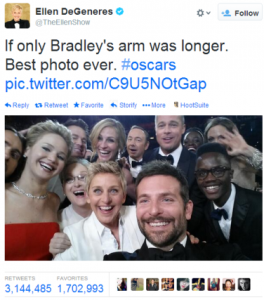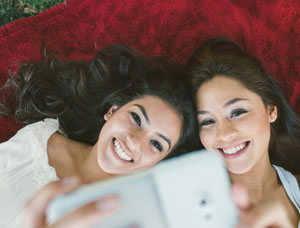“Aren’t we cute?”
Within seconds the selfie pic is posted to Instagram, and Tweeted to her 326 followers. Just another emblematic snapshot from the life of today’s teen.
Five years ago we didn’t even know the word “selfie.” Fast forward to the end of 2013 and it was declared “word of the year.”
What’s the fascination teens have with selfies? Does this desire to snap pics in everyday life make them narcissistic?
When most people hear “selfie,” they probably think of a teenage girl shooting a picture of herself, with some caption about her outfit, her mood or the day. Are these young people a little too obsessed with images of themselves, or is this just the norm?
I guess that depends what you call norm. A brand new PewResearch survey reveals that 55% percent of 18 to 33-year-olds have posted a selfie on a social media site, more than any other generation. So is a little over half, the norm?
 The term “selfie” might be misleading. Sometimes selfies include friends or groups of friends. Ellen DeGeneress’s famous 2014 Oscar selfie is a prime example. Her tweet of the Bradley Cooper selfie, with everyone from Brad Pitt to Jennifer Lawrence squeezing into the frame, was retweeted over 3 million times. This high profile pic is probably a good representation of what many teens want from their selfies: capturing a fun moment in history and documenting it in social media.
The term “selfie” might be misleading. Sometimes selfies include friends or groups of friends. Ellen DeGeneress’s famous 2014 Oscar selfie is a prime example. Her tweet of the Bradley Cooper selfie, with everyone from Brad Pitt to Jennifer Lawrence squeezing into the frame, was retweeted over 3 million times. This high profile pic is probably a good representation of what many teens want from their selfies: capturing a fun moment in history and documenting it in social media.
Maybe that’s why a teen girl will snap a pic of herself ordering her favorite coffee in the morning. “I’m gonna need this today!”
We’ve seen certain recurring trends from these pics:
- The duck face. Puckering the lips, a pose many people revert to.
- The high shot, girls extending their arm upward and shooting down, which often reveals a little too much cleavage… by accident, of course.
- The mirror body shot.
To the outside onlooker, this might seem a little vain or self-absorbed. Look at me! After all, selfie sure sounds a lot like selfish. What is the motive behind each of these pics?
Many of this young generation are critical of the selfie. Sadly, the loudest critique is that of the increasingly popular anonymous critic who shames people in the comments of social media sites, protected by his mysterious screen name: @DBag247 (I made that up… although I wouldn’t be surprised if it was someone’s screen name). This person loves to post cruel comments on selfies, with just enough truth in them to really hurt.
“You probably are posting this pic so we’ll tell you how beautiful you look, when really you’re just a needy girl with daddy issues! Sorry, not gonna conform! #whore”
Maybe that’s why we’ve seen anti-bullying selfie-centric apps arising. Or maybe that’s why so many teens just resort to Snapchat to communicate with their friends, where you can exclusively select those who are going to see the pics. It may be no coincidence that 70% of Snapchat users are females. Girl talking to girl, without any guy onlookers, casting their cruel opinion from the peanut gallery.
Perhaps one of the most accurate criticisms I have heard about selfies was from teenager, Olympia Nelson, in her gritty and slightly sassy expose about the dark undercurrents of the teenage girl’s selfie. In this candid piece, Nelson unveils the intentions behind the teenage selfie:
On these ubiquitous portals, the popularity of girls is hotly contested over one big deal: how sexy can I appear and bring it off with everyone’s admiration?
That’s the reason we see mirror shots, pouting self-portraits of teenagers (typically female) and sexually suggestively posed girls in a mini-dress ”before a party last night”. They’re showing how much they like themselves and hoping that you’ll hit ”like” to reinforce the claim.
Is she right? Is it a coincidence that Nelson just happens to be a little more articulately saying the same thing as @DBag247?
Are teenagers, especially girls, just looking for reinforcement because they want to hear, “You’re pretty,” in a world where most girls think they aren’t?
Or is life just too full of images to ignore documenting some of them along the way?
Why do you think your teens take selfies?
LOOKING FOR WAYS TO OPEN UP THE DOORS OF DIALOGUE WITH YOUR TEENS? YOU’LL LOVE JONATHAN’S BRAND NEW BOOK, GET YOUR TEENAGER TALKING



 Follow
Follow
I actually think it’s a combination of the two. I think all of us, in one way or another, want to be noticed. We want our live to be relevant. We’ll take attention any way we can get it! Girls and guys both want to be found attractive. But we crave connection, relationships, etc. So, I think girls and guys today post all kinds of stuff online, random stuff and selfie “look at me” stuff, to be noticed. It’s all part of the same issue.
Well said Jeremy. I think all of us, if we’re willing to look vulnerably and introspectively, probably do want to be noticed, or even better, liked. At the same time, selfies are the cultural norm, a form of communication sharing our lives with others. Many might not even examine the “why” behind it. They just do it because it’s what people do.
I think the main reason why kids take selfies is that they feel the need to fit in; the need to belong. even if they are likely to get some negative comment the risk is worth the reward of seeing the compliment from their friends posted in the comment section: “gurrrl u look SOOOoooo good!”. most teens care more about their social life than their spiritual life and the desire to be accepted by others is a strong one. I think this is what fuels their fire and feeds their need to take selfies. I think the people close to them need to be aware of how often they are posting and if the behavior becomes obsessive then it’s time to have a little chat. and then there are also going to be those girls (typically girls but sometimes guys) whose primary motivation is to attract attention from a member of the opposite sex. when that is the primary purpose then the innocent selfie becomes a magnet for creeps with bad attentions.
Jonathan, did you see this selfie video from a passenger escaping the plane crash this morning…pretty amazing to think to do this in the midst of the disaster.
http://www.telegraph.co.uk/news/worldnews/northamerica/usa/10697168/Philadelphia-plane-crash-passenger-records-selfie-Oh-my-God-my-plane-just-crashed.html
Jonathan,
I love your content. Always good stuff.
I just led our staff discussion around youth trends and it was a helpful and interesting dialogue. We wrestled with the selfie and the contradictions that seem present in this generation between their care for others in social action and something like the selfie that seems ego-centric.
I am still wrestling with the why behind this, but seems connected to the rise of identity being linked to our social expressions. Is it possible that who we are or who we are perceived to be online is of greater value than in person or at least the starting point for our identity formation? If our online identity has become our starting point for understanding ourselves, then the selfie is a needed expression of identity valuation.
Another question we are wrestling with is why students text instead of call, especially when they intentionally seem to ignore a phone call and text back. Is there something driving that at a deeper level?